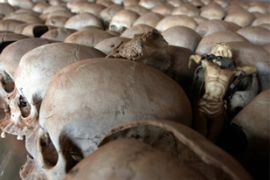Sarkozy admits Rwanda ‘mistakes’
French president says Paris should have done more to prevent 1994 genocide.

‘Horrible crime’
France and Rwanda have sparred for years over an alleged French role in the genocide, in which 500,000 people, mostly ethnic Tutsis but also moderate Hutus, were massacred in frenzied killing led by radical Hutus.
Rwanda’s government and genocide survivor organisations have often accused France of training and equipping the armed groups and former government troops who led the genocide.
In 1998, a French parliamentary panel absolved France of responsibility in the slaughter.
In a news conference following the talks with Kagame, Sarkozy said: “What happened here is unacceptable.
“What happened here requires the international community, including France, to reflect on the errors that prevented it from foreseeing and stopping this horrible crime.”
The eight arrest warrants, which accuse those close to Kagame of a role in the presidential assassination that sparked the genocide, are still active.
But Rwanda has apparently accepted Paris’ insistence that they were ordered not by the French government but by an independent judge.
Intentions questioned
On Wednesday, while en route to Rwanda, Sarkozy stopped in Gabon, then made an unscheduled stop in Mali, where he met with a French aid worker released by al-Qaeda’s North Africa offshoot this week after almost three months in captivity.
Sarkozy has insisted that he wants a healthier relationship with Africa after years of what is known as the “Francafrique,” the French nickname for the secretive network between politicians, businessmen and soldiers in France and Africa.
But Sarkozy’s impromptu stop in Mali raised questions about that intention.
There has been intense speculation that France had put pressure on Mali to free four suspected Islamic fighters from jail to guarantee the safety of the French hostage.
In Mali, Sarkozy thanked Amadou Toumani Toure, the country’s president, for his efforts to free Pierre Camatte, 61, saying that without him, Camatte “would not be here today”.
The Mali court decision to convict the four suspects on arms charges and sentence them to nine months behind bars, which they had already served, resulting in their release, has angered Mali’s neighbours.
Algeria and Mauritania say they are worried that the move will encourage “terrorism” in the region.
Asked whether France had pushed Mali to release the suspected fighters, Alain Joyandet, the French minister for co-operation and Francophony, told Europe-1 radio: “It’s not that simple, there was a trial.”